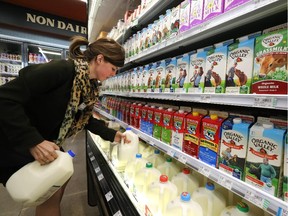'Very twisted': Alberta dairy industry finds itself in the crosshairs of Trump's trade blast

Article content
Alberta dairy farmers at the centre of a developing trade war between Canada and the U.S. are calling President Donald Trump’s targeting of the Canadian industry unfair.
Following a tense G7 meeting, Trump called Prime Minister Justin Trudeau “dishonest and weak” on Twitter, in reference to statements Trudeau made in a press conference regarding retaliatory tariffs on American steel and aluminum products.
Trump stated that the initial American tariffs on Canada were in response to the U.S. paying prices 270 per cent higher on dairy than they should be because of unfair Canadian trade practices.
“I think we need to see some truth come out of the U.S., but that doesn’t seem to hinder the president,” said Albert Kamps, a dairy farmer just outside of Lacombe. “There’s about 500 very worried dairy farmers in Alberta.”
Kamps, vice-chairman of Alberta Milk, the organization representing the province’s dairy farmers, called Trump’s rhetoric “very twisted.”
“We allow the first 10 per cent in with no tariffs. That changes the whole story,” said Kamps. “The U.S. only allows three per cent of their imports to come in without tariffs. We’re the big importers, a five-to-one trade imbalance with the U.S. on dairy alone.”
On Sunday morning, Trump trade adviser Peter Navarro escalated tensions with Canada, saying on Fox News “there’s a special place in hell for any foreign leader that engages in bad faith diplomacy” with the president and “then tries to stab him in the back on the way out the door.”
Economic advisor Larry Kudlow echoed those comments, likening Trudeau’s statements at the G7 to “a betrayal” during an interview on CNN.
“This right now is probably the worse phase of Canada-U.S. relations since probably the early 1960s,” said Mount Royal University political scientist Duane Bratt. “I mean, Trump is right about the problems with supply management, but if it wasn’t supply management it’d be some other issue. Trump just likes a fight.”
He said it’s disingenuous of Trump to now claim U.S. tariffs on aluminum and steel are in response to Canadian tariffs on dairy products.
“He said it was for national security reasons and around NAFTA. NAFTA’s an opportunity to discuss these issues, but that’s not what he’s doing here,” said Bratt. “I don’t know how you negotiate with someone like Donald Trump.”
Bratt said he believed Canadians would rally around Trudeau, something already seen in statements of support from conservatives like former Prime Minister Stephen Harper and Alberta UCP leader Jason Kenney.
“This isn’t policy, it’s personal,” Bratt said. “Do I think we should have supply management? Absolutely not, it’s economically distorting, it increases the price of milk and dairy products. I think Canada would be willing, listening to some of the comments of Trudeau, to discuss that. The problem is how do you discuss that today in response to some of the very over-heightened rhetoric by Trump and his advisors?”
Kamps said Trudeau is right to defend Canada’s supply management system, “which has worked well for 60 years.”
“Knowing the dairy industry, we know that a very small oversupply is devastating to prices,” he said. “It gives a fair price to the farmers, we don’t overproduce where we have to dump milk and we have a fair price at the stores and a guaranteed supply. If Trudeau sacrificed something like this, it would be devastating to Canadian dairy farmers because we’ve built our whole systems knowing that we would get a fair price into the future. You set up your financing for that. It would be if your bank or something took your mortgage and changed it.”
Kamps said he hoped Canada’s leaders could find a way to de-escalate tensions surrounding the dairy industry.
“It’s frustrating because there’s really very little we can do,” he said. “We have to depend on politicians to stand up for our system.”






Postmedia is committed to maintaining a lively but civil forum for discussion. Please keep comments relevant and respectful. Comments may take up to an hour to appear on the site. You will receive an email if there is a reply to your comment, an update to a thread you follow or if a user you follow comments. Visit our Community Guidelines for more information.